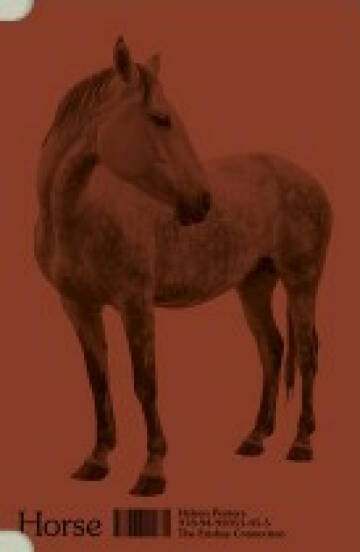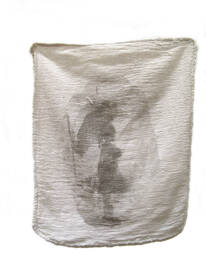Horse
by Heleen Peeters
Photographs: Heleen Peeters
Publisher: Eriskay Connection
232 pages
ISBN: 978-94-92051-56-1
Price: 49 €
Comments: Paperback with wrapped cover, 200 x 305 mm, EN+inlay with Dutch translations, Offset, First edition: 1500, Design:: Rob van Hoesel
The human and the horse share a long history together. At first horses were working animals, serving as a means of transport in agriculture and in war. Nowadays, horses are domestic pets with a moral status: used for recreation, in competitions, and for medical therapy.
In 1948 the grandfather of Heleen Peeters (BE) began a business in what many now consider to be taboo: horse meat. At that time, people were poor, recovering from the struggles of World War II, and horse meat, being a high quality product for an affordable price, was in high demand. But now, 70 years later, the consumption and production of horse meat is disappearing.
Peeters broadly documented and investigated horse (meat) culture in Belgium, France, Italy, Poland, Argentina, Uruguay, Kyrgyzstan, the United States and Canada. Why is horse meat becoming less popular? What happens to horses if they are no longer eaten? How do we relate to animals in the first place? And what about the need to cut back on our meat consumption?
more books tagged »animals« | >> see all
-
The Photography of Nature & The Nature of Photography
by Joan Fontcuberta
sold out -
Proverbs (last copy)
by Gregori Maiofis
Euro 88 -
The House Project (signed - last copy)
by Roger Ballen
Euro 165 -
Ashes and Snow: feather to fire
by Gregory Colbert
sold out -
Endangered
by Erik Hijweege
sold out -
Once a Year
by Axel Hoedt
sold out
more books tagged »Dutch« | >> see all
-
Sequester (second edition - signed)
by Awoiska Van Der Molen
sold out -
west
by Regina Maria Anzenberger
Euro 56 28.00 -
Blanco (last copy)
by Awoiska Van Der Molen
sold out -
Offstage (signed - review copy)
by Dana Lixenberg
sold out -
Paris - New York - Shanghai
by Hans Eijkelboom
sold out -
LEXICON (last copies)
by Viviane Sassen
sold out
more books tagged »horses« | >> see all
Random selection from the Virtual bookshelf josefchladek.com
Horse
by Heleen Peeters
Photographs: Heleen Peeters
Publisher: Eriskay Connection
232 pages
ISBN: 978-94-92051-56-1
Price: 49 €
Comments: Paperback with wrapped cover, 200 x 305 mm, EN+inlay with Dutch translations, Offset, First edition: 1500, Design:: Rob van Hoesel
The human and the horse share a long history together. At first horses were working animals, serving as a means of transport in agriculture and in war. Nowadays, horses are domestic pets with a moral status: used for recreation, in competitions, and for medical therapy.
In 1948 the grandfather of Heleen Peeters (BE) began a business in what many now consider to be taboo: horse meat. At that time, people were poor, recovering from the struggles of World War II, and horse meat, being a high quality product for an affordable price, was in high demand. But now, 70 years later, the consumption and production of horse meat is disappearing.
Peeters broadly documented and investigated horse (meat) culture in Belgium, France, Italy, Poland, Argentina, Uruguay, Kyrgyzstan, the United States and Canada. Why is horse meat becoming less popular? What happens to horses if they are no longer eaten? How do we relate to animals in the first place? And what about the need to cut back on our meat consumption?
more books tagged »animals« | >> see all
-
The Photography of Nature & The Nature of Photography
by Joan Fontcuberta
sold out -
Proverbs (last copy)
by Gregori Maiofis
Euro 88 -
The House Project (signed - last copy)
by Roger Ballen
Euro 165 -
Ashes and Snow: feather to fire
by Gregory Colbert
sold out -
Endangered
by Erik Hijweege
sold out -
Once a Year
by Axel Hoedt
sold out
more books tagged »Dutch« | >> see all
-
Sequester (second edition - signed)
by Awoiska Van Der Molen
sold out -
west
by Regina Maria Anzenberger
Euro 56 28.00 -
Blanco (last copy)
by Awoiska Van Der Molen
sold out -
Offstage (signed - review copy)
by Dana Lixenberg
sold out -
Paris - New York - Shanghai
by Hans Eijkelboom
sold out -
LEXICON (last copies)
by Viviane Sassen
sold out
more books tagged »horses« | >> see all
Random selection from the Virtual bookshelf josefchladek.com
Horse
by Heleen Peeters
Photographs: Heleen Peeters
Publisher: Eriskay Connection
232 pages
ISBN: 978-94-92051-56-1
Price: 49 €
Comments: Paperback with wrapped cover, 200 x 305 mm, EN+inlay with Dutch translations, Offset, First edition: 1500, Design:: Rob van Hoesel
The human and the horse share a long history together. At first horses were working animals, serving as a means of transport in agriculture and in war. Nowadays, horses are domestic pets with a moral status: used for recreation, in competitions, and for medical therapy.
In 1948 the grandfather of Heleen Peeters (BE) began a business in what many now consider to be taboo: horse meat. At that time, people were poor, recovering from the struggles of World War II, and horse meat, being a high quality product for an affordable price, was in high demand. But now, 70 years later, the consumption and production of horse meat is disappearing.
Peeters broadly documented and investigated horse (meat) culture in Belgium, France, Italy, Poland, Argentina, Uruguay, Kyrgyzstan, the United States and Canada. Why is horse meat becoming less popular? What happens to horses if they are no longer eaten? How do we relate to animals in the first place? And what about the need to cut back on our meat consumption?
more books tagged »animals« | >> see all
-
The Photography of Nature & The Nature of Photography
by Joan Fontcuberta
sold out -
Proverbs (last copy)
by Gregori Maiofis
Euro 88 -
The House Project (signed - last copy)
by Roger Ballen
Euro 165 -
Ashes and Snow: feather to fire
by Gregory Colbert
sold out -
Endangered
by Erik Hijweege
sold out -
Once a Year
by Axel Hoedt
sold out
more books tagged »Dutch« | >> see all
-
Sequester (second edition - signed)
by Awoiska Van Der Molen
sold out -
west
by Regina Maria Anzenberger
Euro 56 28.00 -
Blanco (last copy)
by Awoiska Van Der Molen
sold out -
Offstage (signed - review copy)
by Dana Lixenberg
sold out -
Paris - New York - Shanghai
by Hans Eijkelboom
sold out -
LEXICON (last copies)
by Viviane Sassen
sold out
more books tagged »horses« | >> see all
Random selection from the Virtual bookshelf josefchladek.com








































;jpg?c=91eed09043b64d7eea9a16d452f27d00)





;jpg?c=cf522f7b3948f07b9625187c3c312f39)

;jpg?c=aa3f40f604606d120cf001a56c863c89)


